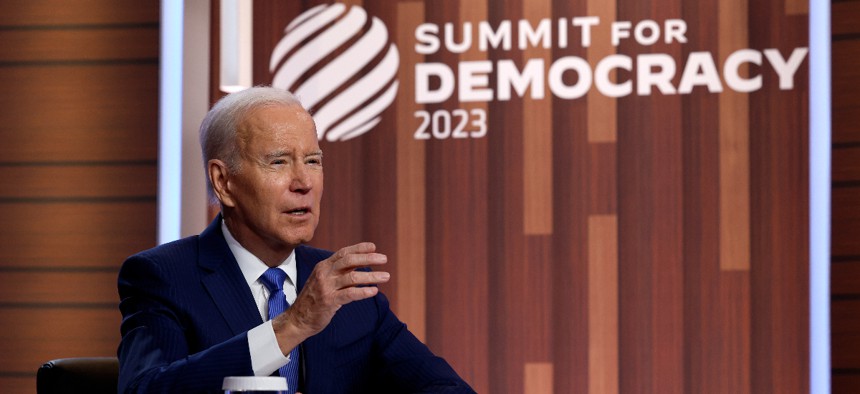White House Takes Spyware Efforts to the International Stage

President Joe Biden delivers remarks while hosting the virtual Summit for Democracy Virtual Plenary session from the South Court Auditorium in the Eisenhower Executive Office Building on March 29, 2023 in Washington, DC. Chip Somodevilla/Getty Images
The Summit for Democracy will launch and fortify several global partnerships aimed at offering some regulation for emerging tech usage.
Preventing the misuse of certain emerging technologies continues to be a major theme at the second Summit for Democracy, with the Biden administration announcing the start of new bilateral initiatives meant to ensure emerging technologies work in harmony with democratic values.
Among them is an international effort to address potential abuses associated with commercial spyware.
“We will be unveiling as part of the summit…what we view as the multifaceted challenge posed by the proliferation and misuse of commercial spyware,” a senior administration official said during a Wednesday press call.
Building upon President Joe Biden’s recent executive order prohibiting the usage of certain commercial spyware technologies among U.S. government agencies, a key tech goal for the summit participants is to develop similar international regulations.
Spyware technologies have been misused recently within authoritarian regimes to undermine civil rights. The executive order from the White House restricts commercial spyware use and sale in U.S. government operations and puts some manufacturers on the Department of Commerce’s export control list.
The new diplomatic effort on preventing the misuse of commercial spyware expands the goals of that order, with the senior administration official noting that this is “the first time and the first opportunity to really deepen international cooperation on countering the proliferation and misuse of commercial spyware.”
Initial partners on this effort include Australia, Canada, Costa Rica, Denmark, France, New Zealand, Norway, Sweden, Switzerland and the United Kingdom.
“This is really a novel initiative to underscore that we jointly view the threat from the risk posed by the misuse of commercial spyware the same way, and that we agree on the need for strict domestic and international controls on the proliferation and use of this technology,” the official said.
A joint statement on the spyware initiative will be released on Thursday as part of the summit. The spyware initiative will also stand as the first example of the Summit attendee’s effort to address how emerging technologies can best align with functioning democracies.
“The President noted that through the Summit for Democracy, we're really leaning into our agenda on ensuring the technology works for and not against democratic societies,” the administration official said.
Successfully implementing technology in a manner that is compatible with functioning democratic institutions requires three steps, according to the administration official. Over the course of the summer, the U.S. and joining countries will be working toward putting forward a shared vision of how technology can enable positive socioeconomic development, how to avoid abuse of new technologies in those developments, and how to weave these goals into existing democratic governments.
On the cybersecurity front, which has become a key part of geopolitical security issues, the Cybersecurity and Infrastructure Security Agency is strengthening its High Risk Community Protection Initiative, an effort that aims to protect vulnerable individuals and groups from corruption.
The administration officials told reporters that CISA counterparts in other countries will join in this effort.
“CISA is also partnering with its counterparts, other national cybersecurity centers, to deepen international cooperation on how to better protect those at risk within their borders,” the official said.
Initial countries involved in this effort include Australia, Canada, Denmark, Estonia, France, Japan, New Zealand and Norway.
“This is truly an effort across departments and agencies, which reflects the administration's belief that strengthening and defending democracy at home and abroad must be a whole of government effort,” the official concluded.






